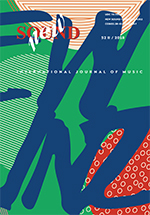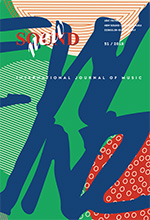Issue No. 48
Composer Speaks
Ana Kotevska – CRITICAL WRITINGS OF PIERRE BOULEZ – A TREASURY
FOR THE CONTEMPORARY MUSIC.
Interview with François Nicolas
Download: ser / eng
Core Issue – Orientations, Homage to Pierre Boulez
Sanela Nikolić – A BIOGRAPHY OF BOULEZ AS A MUSIC WRITER
Abstract: In the period from 1948, the writings of Pierre Boulez were published in several
languages and in over forty magazines of art and contemporary music. They were also
published in the programmes for concerts Domaine musical, for the performances of
Wagner’s pieces in Bayreuth, in over sixteen booklets for the editions of the records on “new music”, in the forewords for different studies, in five collections printed in several
volumes – amounting to over a hundred and thirty texts. The number of publications of
Boulez articles is, however, almost four times as many as the number of titles, since a lot
of texts were published several times and translated into other languages in different magazines or collections. This text follows the chronology and history of the shaping and
multiplication of Boulez writings in detail. The sheer size of theoretical work and its diverse trajectories point to the importance of Boulez work as a music writer not only for
understanding his work as a composer and a conductor, but also for the whole theoretical
climate in the post-war modernist world of art he experienced.
Keywords: Boulez, journals, collected writings, autopoetic discourse, post-war modernism
Download: ser / eng
Anja Lazarević – BOULEZ’S ORIENTATION TOWARDS UNDERSTANDING THE
BEGINNINGS OF CONTEMPORARY MUSIC: “MAHLER – OUR
CONTEMPORARY?”
Abstract: The central part of Orientations – the collected writings of Pierre Boulez is
based on Boulez’s mostly short texts about composers whom he considered relevant for
his oeuvre and contemplations of music. In addition to other texts, in the part of the book
entitled “Examples”, Boulez wrote three chapters on the composer Gustav Mahler. Besides Orientations, Boules often spoke about Mahler in his interviews and at lectures he
gave. His idea of Mahler was in fact the idea of the beginnings of contemporary music.
Considering Boulez’s sharp sentences, we come across a wealthy network of judgements
about Mahler and his wide influence on twentieth century music, and we acquire a better
understanding of Mahler, who, according to Boulez’s statements, could be understood
only from the perspective of contemporary music.
Keywords: Pierre Boulez, Orientations/writings, interviews, twentieth century music,
Gustav Mahler, influences
Download: ser / eng
Andrija Filipović – FROM THE SENSATION TO THE CONCEPT AND BACK:
PHILO-AESTHETIC ENCOUNTERS BETWEEN PIERRE
BOULEZ AND GILLES DELEUZE
Abstract: It is known that Deleuze and Guattari took the famous concepts of the smooth
(lisse) and striated (strié) from the last chapter of A Thousand Plateaus from Boulez, who
used them to describe the morphology of sound spaces, while Deleuze and Guattari used
those concepts in an ontopolitical way – in order to invent an ontology abstract enough to
describe the constitution of space and time within the conditions of the capitalist axiomatic and find the corresponding lines of flight. Another important point in the encounter
between Boulez and Deleuze is the concept of difference. In Deleuze, difference is the key
ontological concept, which (un)grounds the image of thought based on representation and
leads to becoming the basic form of thinking the world. According to Campbell, in Boulez,
difference appears in a number of ways – from heterophony as a virtual line, through an
accumulative development to athematism as a virtual form. It should be mentioned that
virtual (virtuel) is another important concept of Deleuze’s philosophy, (un)grounded precisely through difference. Furthermore, there is a certain similarity between Boulez’s
concept of diagonal and Deleuze’s and Guattari’s concepts of deterritorialization and
transversality in the sense that all three of these designate the creation of the new in movement between the already known coordinates. In the end, Deleuze translates Boulez’s
concepts of temps pulsée and temps non pulsée into the concepts of Chronos and Aion,
where Aion designates the qualitative time of becoming, while Chronos the quantitative
time of representative thought. The goal of this paper is to research these complex philosophical-aesthetic encounters between Boulez and Deleuze in order to shed light on the
ways in which philosophical concepts are created based on art practices, and art practices
on the basis of philosophy.
Keywords:
Boulez, Deleuze, time, difference, virtual, becoming, striated, smooth
Download: ser / eng
Geraldine Finn – SETTING MUSIC TO POETRY AND PROSE
Download: ser / eng
Marija Maglov – PAST MUSIC, FUTURE MUSIC: TECHNOLOGY AND MUSIC
INSTITUTIONS IN THE 20th CENTURY
Abstract: In his text Technology and the Composer Pierre Boulez writes about new technologies that emerged in the 20th century, primarily created for the purposes of music recording and reproduction, but also established as a means of innovation in electronic and
electro-acoustic music practice. Boulez points to two directions where technology and
music are in question: conservative historicism and progressive technology, enabling the
development of new music material and innovation. By using Boulez’s text(s) as a point
of departure, the author considers the roles those new technologies had in the development
of some musical institutions and questions how institutionalized discourse moulds ideas
on the roles music technology should have. The aim of the paper is to discuss how the
music of the past was ‘conserved’ and how the music of the future was created in particular types of music institutions thanks to new technological possibilities.
Keywords: Pierre Boulez, technology, institution, ‘museum’, innovation
Download: ser / eng
Interpretations
Žarko Cvejić – FROM MEN TO MACHINES AND BACK: AUTOMATA AND THE
RECEPTION OF VIRTUOSITY IN EUROPEAN INSTRUMENTAL
ART MUSIC, C. 1815–C. 1850
Abstract: In most histories of Western music, the 1830s and 40s are typically described
as “the age/era of virtuosity and/or virtuosi”. Indeed, major contemporary sources, including leading musical journals of the time, teem with reports on the latest exploits of Liszt
and his rivals and in much of this body of criticism, piano and violin virtuosi were commonly celebrated for pushing the limits of humanly conceivable excellence in musical
performance. However, a significant number of these critical responses were also negative, critiquing individual virtuosi for playing not like humans, but like automata. My
claim in this article, documented with a detailed perusal of contemporary music criticism,
is that this line of anti-virtuosic critique was part of the larger 19th-century suspicion of
virtuosity as super- but also, perhaps, non-humanly accomplished, automatic technique,
devoid of all emotion, expression, that is, of human presence and content. Also, I propose
to interpret this line of criticism with reference to the even broader 19th-century anxiety
over the issue of human subjectivity, that is, its freedom, evident not only in contemporary philosophy (Schelling, Schopenhauer, Novalis, etc.), but also in literature. Such narratives
and, as I argue in this paper, much of contemporary criticism of virtuosity were shaped by
the uncanny feeling that the human subject, too, like automata and “automatic” virtuosi,
may not be free, contrary to the Enlightenment view of the human subject in Rousseau,
Kant, and others, but actually under the power of mechanisms beyond itself, operating
automatically and not of its own accord. In contemporary criticism of virtuosity, the elusive notions of expression, expressivity, expressive playing and the like, which were deliberately kept under-explained, were then marshalled to preserve the supposedly ineffable
or at least ineffably human core of musical performance, in line with the contemporary
Romantic view of music as the only means of expressing what is otherwise inexpressible,
that is, ineffable.
Keywords: virtuosity, automata, human subjectivity, music criticism
Download: ser / eng
Ivana Ančić – SOUND FROM THE CLOUD: METAMORPHOSES OF
TECHNICAL AND ARTISTIC PARADIGMS IN
THE SOCIAL RECEPTION OF SOUND AND MUSIC
Abstract: In this paper on the example of the cloud I intend to research and analyze the
changes of artistic paradigms and practices in music that occurred due to the technological
development, digitalization process and implementation of new media. With the rapid
growth of technology and its immersion in digital screen culture, reality has become virtual and augmented, moving our perception to a different, new perspective – the cloud perspective. Sound from the cloud represents a new category of the production, distribution, consumption and perception of sound, the new sound/cloud discourse. This is the
case of sound coming from virtual space, but due to the development of new devices and
mobile phones it does not require the connection of the consumer to the computer, but is
already connected through the mobile and omnipresent web. The purpose of this paper is
to focus on the impacts achieved in the field of music by the system of recording and
sound reproduction and digital technology, as well as to analyze some theoretical issues
provoked by these changes. The special focus of the research is an innovative artistic
practice which has developed parallel with technological development, digital consumption and listening habits, contrary to artistic experience. This paper should confirm that
the rapid and intensive development of technology and devices is developing a new space
and intimate connection between authors, prosumers and consumers. The research should
also confirm the hypothesis that the cloud is an entity, an autonomous system, a live organism in constant change, dependent and in a constant process of interaction.
Keyowrds: digital technology, sound/music, Internet, cloud computing, cloud, apparatus
Download: ser / eng
New Works
Vesna Mikić – TRAVELLING THROUGH THE BOXES OF SOUND 1 & 2:
SRĐAN HOFMAN’S WORLD BEYOND THE MIRROR
Abstract: The idea behind this paper is to present two of the most recent works by Srđan
Hofman (1944), which he regards as a diptych; the first of them won the 2015 Mokranjac
Award. With its interpretation based on the central position that manipulating with composed sound objects occupies in Hofman’s work, the text offers a discussion of the positioning of these works in Hofman’s oeuvre so far.
Keywords: Srđan Hofman, sound, object, Serbian contemporary music, Mokranjac
Award
Download: ser / eng
Analysis
Jelena Janković Beguš – PLAYING THE GAME WITH ALEATORICS AND
NARRATIVITY: LINAIA-AGON BY IANNIS XENAKIS
Abstract: In this article I examine the piece Linaia-Agon for brass trio (1972) by Greek-French composer Iannis Xenakis, one of only three pieces by this composer, which are
commonly referred to in literature as “game-pieces”, from the perspective of Roger Caillois’ typology of games, stemming from the social sciences, as well as from the framework
of the mathematical game theory and its branch probability theory. Xenakis’ “game
pieces” belong to the field of controlled aleatorics, because they employ a certain level
of indeterminacy; here I argue that it is precisely in this aspect of indeterminacy that their
nature “as games” is revealed. I am concerned with the “translation” of the Ancient Greek
legend about the musician Linos and the god Apollo – and of the mathematical calculations – into the language of the West European avant-garde music of the second half of
the 20th century.
Keywords: Iannis Xenakis, Linaia-Agon, “game pieces”, Roger Caillois, game theory,
probability theory, aleatorics
Download: ser / eng
Views
Ivan Brkljačić – A PERSONAl PERSPECTIVE: INTERNATIONAL REVIEW OF
COMPOSERS
Download: ser / eng
Reviews
Nataša Crnjanski – Musical Gesture as Creative
Interface.
March 17–19, 2016,
Universidade Católica Portuguesa,
Porto, Portugal
Download: ser / eng
Radoš Mitrović – Gaudeamus Muziekweek (7–11 september 2016)
Download: ser / eng
Radoš Mitrović – 25th International Composers’ Review
Download: ser / eng


